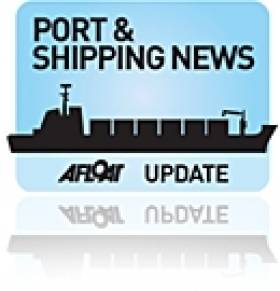Displaying items by tag: River Leitrim
Cargoship Gets into Scrap in Wicklow
The cargoship Arklow Rebel (2,999 gross tonnes) which loaded scrap metal in Wicklow Port today, is believed to be the largest Arklow Shipping Ltd vessel to dock in the east coast port, writes Jehan Ashmore.
The 7-year old Dutch-built vessel arrived in ballast from Warrenpoint Co. Down around 01.30hrs to berth alongside the town's south quays at the Packet Quay.
Throughout this afternoon there was a steady stream of lorries laden with the scrap-metal which was loaded into the ship's hull by a quayside grabber. Upon completion of loading, the distinctive green hulled Arklow Rebel departed this evening bound for Liverpool.
She is one of nine 'R'class series of ships built by the Dutch shipyard of Barkmeijer Stroobos B.V. and has the following dimensions (90m length X 12m breath X 4m draft). For further vessel characteristics click HERE.
The Irish-flagged vessel is registered at the neighbouring port of Arklow to the south and is part of a fleet of over 40 ships managed by the Tyrrell family.
During the boom years Wicklow port was particularly busy with Scandinavian imports of bundled packaged timber and plasterboard for the construction industry.
The tidal port at the mouth of the River Leitrim also specialises in paper, lead, steel and dry bulk cargoes, principally coal in addition to other general and heavy-lift project cargoes.
For many years the issue of road traffic congestion was finally solved when the Wicklow Port Access and Town Relief Road Scheme was completed in April of last year.
The port access road (1.6km) runs between the Rathnew Road to The Murrough via a bridge that crosses the Broadlough Estuary and over the Dublin-Rosslare railway line.
- Wicklow
- Arklow Shipping Ltd
- Wicklow harbour
- Liverpool
- ASL
- Wicklow Port
- Port of Wicklow
- Wicklow Port Access and Town Relief Scheme
- Arklow Rebel
- Tyrrell
- ScrapMetal
- Port and Shipping News
- Packet Quay Wicklow
- Wicklow Port Company
- Broadlough Estuary
- River Leitrim
- The Murrough
- DublinRosslare railway line
- Barkmeijer Stoobos B.V.
























































